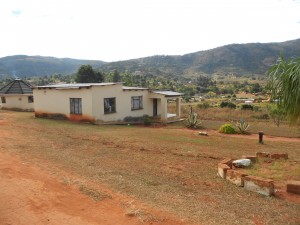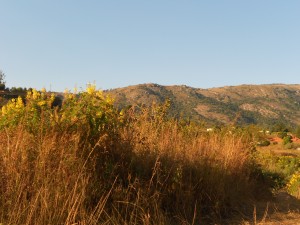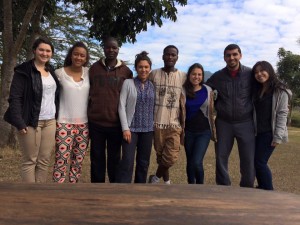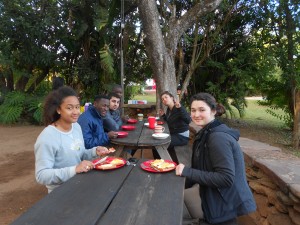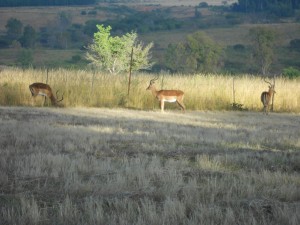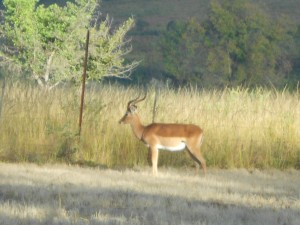Since our first ISL pre-departure sessions, we were warned that we would feel uncomfortable and would need some time to adapt to our new environments. We also learned that discomfort should be used as a learning opportunity—that is, we should not only be prepared to feel uncomfortable during our placements, but we should actually strive to get out of our comfort zones in order to foster a heightened sense of critical thinking, reflection, and self awareness. As one of my favourite professors at UBC told me when she heard about my trip: “I hope you get a chance to feel uncomfortable, but secure enough to be open to all the new experiences!” So, when I say I felt “uncomfortable,” I do not mean it as a complaint, but as a positive experience!
Sure, I had been warned that Swaziland would be very different from Canada (and even Colombia). I was expecting different landscapes, different weather, different cultures, different people, different buildings, and even different meals from the ones back home. What I did not expect, however, was a different identity. By this, I do not mean that Swaziland has magically transformed my identity; I mean that the way I am perceived by others (and even by myself) is very different from the way that I am perceived back home.
Katie and I have been staying with our host mum for almost two weeks now, and it has been great! We live in an area called Egelekeceni (the C is pronounced with a click sound and the K actually sounds like a G). Mama Phindile, Londiwe, Katie, and I live in the same house. Mama Letla (Mama’s sister in law), her four children, and Telephone live in neighbouring houses.
On the first day with our host family, Telephone showed us around Egelekeceni. As we walked by the stores and the crowded streets, Telephone started dancing, greeting neighbours, introducing them to us, and teaching us more Siswati words. Even though it was very exciting to be walking around the homesteads and experiencing a little chunk of Swazi life, I have to admit that this was also the first time I actually felt “uncomfortable.”
In preparation for my placement, I took a research-based sociology course where we learned how to conduct informal interviews, ethnographies and observation. I was expecting to come in as a researcher—to somehow observe this new environment and gain a better understanding of the social world around me. However, Katie and I were not “observing” as much as we were “being observed” during our walk. Telephone told us that locals were not used to seeing “people like us” walking around dirt roads. We were being gazed at, and it made me uncomfortable.
But, why did I feel so uncomfortable being observed? Of course, there is the obvious reason: we, Westerners, are taught that staring at people is rude. But, beyond that, the act of “looking” has a deeper meaning. According to psychologist Jaques Lacan, “The Gaze” (actually borrowed from film theory,) describes the relationship between “the observer” and “the observed”. Typically, “the observer” is considered to be the subject— the person who determines how to define, describe and label “the observed”. The “observed,” on the other hand, loses agency and is rendered as an object that is at the mercy of the gazer’s assumptions.
I am not used to being the “object” of the gaze. This new position made me feel uncomfortable because it showed a clear reversal of the operation of power that I had foreseen—I am no longer a researcher attempting to interpret data, but am now an object of research. An object that is clearly privileged, white and foreigner. Again, I am not using the word “uncomfortable” to victimize myself; I want to start using this term in a more positive light!
I have been in Swaziland for almost two weeks now and have gotten more used to the ‘gaze.’ I also think it is diminishing as people around our community and workplace become more familiar with us. Most importantly, I realized that (sometimes) it is important to be ‘gazed at’— I can’t expect to engage in cross-cultural service work if all the learning and observation is only flowing one way. I can’t uni-laterally observe and not expect to be observed. This “uncomfortable” experience has also made me more cautious of the way that I interact with people and environments around me. I must avoid reducing people (or cultures) to objects of study, even when undertaking assessment and research work in SOS Children’s Village. Instead, I must acknowledge that we are all complex, ever-changing subjects, with agency and valuable knowledge.
As for the assumptions that the “observer” can hold, it is important that both parties go beyond “gazing,” and actually begin communicating in order to break down stereotypical suppositions about a person. Although the language barrier has made this more difficult, Katie and I have started having conversations with neighbours, people at the Kombi station, and SOS staff. These conversations have broken down many of our assumptions, and (hopefully,) some of theirs!
